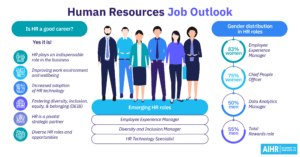The career in human resources (HR) is a vital organizational department focused on overseeing various aspects related to personnel management. Its responsibilities encompass a wide range of functions, including the recruitment and selection of employees, handling employee relations, facilitating training and development programs, managing benefits and compensation, and ensuring adherence to employment laws and regulations.

Read Also: Blue Beacon Employee Portal 2024 : Access and Navigate the Portal
Key Roles of Human Resources
One of the key roles of Human Resources is to create and maintain a positive work environment. This involves cultivating a workplace culture that promotes collaboration, diversity, and employee well-being. HR professionals often serve as intermediaries in resolving conflicts and facilitating communication between employees and management.
Recruitment is a significant component of Human Resources, involving the identification and hiring of qualified candidates to meet the organization’s staffing needs. This process includes job postings, candidate interviews, and on-boarding procedures.
Employee relations is another crucial aspect, addressing issues such as workplace conflicts, performance management, and employee satisfaction. Human Resources strives to create an atmosphere that encourages open communication and ensures fair treatment of all employees.
Training and development initiatives are designed to enhance employees’ skills and knowledge, contributing to their professional growth and the overall success of the organization. Additionally, HR manages benefits programs, including health insurance, retirement plans, and other perks that contribute to employees’ overall job satisfaction.
Compliance with employment laws is a fundamental responsibility for HR professionals. Staying informed about labor regulations and ensuring the organization follows them is essential to avoid legal issues.
In essence, Human Resources plays a multifaceted role in supporting both the organization and its employees, contributing to a harmonious and effective workplace environment.
Read Also: Mines Canvas Login 2024 | Colorado School of Mines
Career in Human Resources

A career in Human Resources involves managing and optimizing the human capital within an organization. HR professionals are responsible for various aspects, including recruitment, employee relations, training, compensation, and ensuring compliance with employment laws.
This career focuses on creating a positive work environment, supporting employee well-being, and contributing to the overall success of the organization through effective people management.
7 Signs a Career in Human Resources Might Be Perfect For You
-
People-Oriented Nature:
Discovering joy in engaging with people and understanding their needs is a pivotal sign that a career in Human Resources might align seamlessly with your inherent qualities. This profession thrives on individuals who genuinely enjoy interacting with others, supporting their professional journeys, and contributing to a positive workplace environment.
-
Problem-Solving Skills:
Demonstrating strong problem-solving skills is a significant indicator of compatibility with a career in HR. Career in Human Resources often serve as mediators in workplace conflicts and navigate challenges, necessitating individuals who excel in finding effective and fair solutions that enhance overall work dynamics.
-
Effective Communication:
Possessing excellent communication skills, both verbal and written, and the ability to convey information clearly and diplomatically are essential aspects of a successful HR career. HR professionals regularly engage with various stakeholders, requiring effective communication to address diverse needs and concerns.
-
Empathy:
Empathy is a defining quality for a successful career in human resources. If you naturally understand and resonate with others’ perspectives and emotions, particularly during challenging times, you bring a valuable dimension to the supportive and people-centric nature of HR.
-
Interest in Professional Development:
Expressing an interest in facilitating professional development is a strong sign of alignment with HR roles. A career in human resources involves designing and implementing programs that enhance employees’ skills, contributing not only to individual growth but also to the overall success of the organization.
-
Ethical Conduct:
Valuing ethical conduct is a foundational aspect of a career in human resources. Professionals in this field handle sensitive information and navigate complex ethical dilemmas, making integrity, confidentiality, and ethical behavior in the workplace fundamental principles upheld in HR roles.
-
Adaptability:
Adaptability is a key attribute for a successful career in human resources. The dynamic nature of HR roles requires individuals who can navigate unexpected challenges, embrace changes in policies, technologies, and organizational structures, and thrive in an ever-evolving professional landscape.

Read Also: De Anza MyPortal 2024
Starting a Career in Human Resources
Starting a career in Human Resource typically involves the following steps:
- Educational Background: Obtain a relevant degree in Human Resources, Business Administration, Psychology, or a related field. A bachelor’s degree is often the entry-level requirement.
- Gain Relevant Skills and Knowledge: Develop skills such as communication, interpersonal skills, problem-solving, and a good understanding of human behavior in the workplace.
- Internships and Entry-Level Positions: Seek internships or entry-level positions in HR or related fields to gain practical experience. This provides exposure to HR functions and helps build a professional network.
- Certifications: Consider obtaining professional certifications in Human Resources, such as the Professional in Human Resources (PHR) or the Society for Human Resource Management Certified Professional (SHRM-CP). Certifications can enhance your credibility and marketability.
- Networking: Attend industry events, seminars, and networking functions to connect with HR professionals. Networking can open up opportunities for mentorship and job prospects.
- Build a Strong Resume: Craft a well-structured resume that highlights relevant education, skills, internships, and any HR-related experiences.
- Online Presence: Create a professional LinkedIn profile to showcase your skills, education, and any HR-related projects or experiences. LinkedIn is often used by organizations to identify possible applicants.
- Apply for Entry-Level Positions: Apply for entry-level HR positions, such as HR Assistant or Coordinator roles, to start gaining hands-on experience.
- Showcase Relevant Experience: Emphasize any transferable skills from previous roles, even if they aren’t directly related to HR. For example, customer service, communication, and problem-solving skills are valuable in HR.
- Continued Learning: Stay informed about industry trends, employment laws, and HR best practices. Continuous learning can be achieved through workshops, seminars, and online courses.
- Seek Mentorship: Look for mentors within the HR field who can provide guidance, share insights, and help navigate your career path.
Read Also: All 4 Colleges and Universities in Brooklyn, New York
Challenges of Starting a Career in Human Resources

Embarking on a career in Human Resources (HR) is a journey filled with challenges that require adept navigation and strategic resilience. One of the primary hurdles facing HR professionals is the need to navigate workplace conflicts effectively.
As mediators in organizational dynamics, HR individuals must hone strong interpersonal skills and foster empathy to address conflicts, ensuring a harmonious work environment conducive to productivity and growth.
A delicate balancing act is inherent in HR roles, as professionals must reconcile the interests of individual employees with the overarching goals of the organization. Striking this equilibrium demands a nuanced understanding of employee well-being alongside the imperative to align with organizational objectives.
The challenge lies in managing situations where individual and organizational interests may not always align perfectly, necessitating diplomatic and strategic decision-making.
Staying abreast of ever-evolving employment laws and regulations is a substantial challenge in HR. The legal landscape is dynamic, and HR professionals must remain vigilant to ensure organizational practices comply with these standards.
The consequence of falling short in legal compliance can pose significant risks, reinforcing the importance of constant vigilance and ongoing education within the HR field. Handling sensitive information is an inherent challenge in HR, where professionals are entrusted with confidential employee data.
Maintaining the highest level of integrity, discretion, and data security is paramount. Safeguarding this sensitive information while fulfilling the responsibilities of HR roles requires a meticulous approach and a commitment to ethical conduct.
Adaptability is a defining characteristic for success in HR, as the profession operates in an environment of continuous change. Whether it’s adapting to new policies, embracing technological advancements, or navigating shifts in organizational structures, HR professionals must demonstrate resilience and agility to manage transitions seamlessly.
Retaining top talent and fostering employee engagement pose persistent challenges in HR. Developing strategies to keep employees motivated, satisfied, and aligned with organizational goals requires creative thinking and an understanding of diverse employee needs.
Balancing the varied expectations of a modern, diverse workforce is a continuous effort, demanding flexibility and proactive measures from HR professionals. The integration of HR technology is revolutionizing the field, presenting opportunities and challenges.
Keeping pace with technological advancements and effectively utilizing HR software tools are challenges for professionals who must bridge the gap between traditional HR practices and modern technological solutions.
Leadership development and succession planning are ongoing challenges for HR. Identifying and nurturing leadership skills within the organization while addressing the ever-evolving demands of succession planning requires strategic foresight and a commitment to cultivating talent.
Lastly, promoting workplace diversity and inclusion is a priority for HR, but it comes with its own set of challenges. Overcoming biases, fostering inclusivity, and championing diversity initiatives demand a proactive and sustained effort.
While these challenges may seem formidable, they also provide opportunities for growth and development within the HR profession. Overcoming these hurdles contributes to the evolution of HR professionals, making them better equipped to handle the complexities of the modern workplace and contribute meaningfully to organizational success.
Read Also: cheapest universities in California for international students in 2024
In conclusion, recognizing the signs that a career in Human Resources might be perfect for you reveals a path filled with interpersonal engagement, problem-solving, and strategic impact. If you possess a people-oriented nature, problem-solving skills, effective communication, and empathy, a career in HR aligns well with your strengths.
The ability to foster positive relationships, facilitate training, and navigate ethical conduct makes HR an ideal choice for those who seek a profession centered on human dynamics. Ultimately, if the identified signs resonate with your interests and capabilities, pursuing a career in Human Resources can lead to a fulfilling and impactful professional journey.
